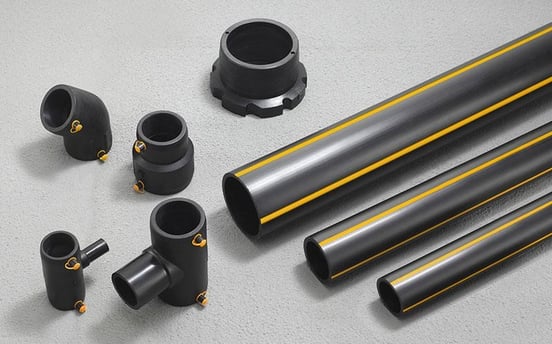What Materials Are Used in Gas Pipeline Installations?
Gas pipeline installations are a critical component of modern homes, ensuring the safe and efficient supply of natural gas for cooking and heating needs. Choosing the right materials for gas pipelines is essential for safety, durability, and performance. This blog explores the most commonly used materials in gas pipeline installations and why they matter, especially when opting for a reliable gas pipeline installation service
11/26/20242 min read


1. Steel Pipelines
Steel has been a traditional choice for gas pipeline installations, particularly in industrial and high-pressure applications.
Advantages:
High strength and durability.
Excellent resistance to internal pressure.
Long lifespan in appropriate conditions.
Limitations:
Susceptible to corrosion if not treated or coated.
Heavier and more expensive than other materials.
Usage:
Steel pipelines are commonly used in underground systems or external installations where higher pressures are involved.
2. Copper Pipes
Copper is a widely preferred material for residential gas pipeline installation due to its versatility.
Advantages:
Resistant to corrosion.
Lightweight and easy to install.
Excellent thermal conductivity.
Limitations:
Relatively high cost compared to alternatives.
May not be suitable for certain types of gas due to reactivity.
Usage:
Ideal for indoor installations and homes requiring low-pressure gas distribution.
3. Polyethylene (PE) Pipes
Polyethylene is a modern and increasingly popular choice for gas pipeline installation service providers.
Advantages:
Flexible and lightweight, making installation easier.
Resistant to corrosion, chemicals, and UV rays.
Affordable compared to metal pipes.
Limitations:
Not suitable for above-ground installations due to UV degradation (if not treated).
Requires special fittings and connectors.
Usage:
PE pipes are primarily used for underground gas pipelines in residential and commercial settings.
4. CSST (Corrugated Stainless Steel Tubing)
CSST is a relatively new material that combines the benefits of flexibility and strength.
Advantages:
Easy to bend and install, reducing labor costs.
Corrosion-resistant and highly durable.
Available in various lengths, reducing the need for joints and fittings.
Limitations:
Requires proper grounding to prevent electrical hazards.
Higher upfront cost compared to traditional materials.
Usage:
Ideal for complex installations where flexibility is a priority, such as in multi-story buildings.
5. PVC (Polyvinyl Chloride) Pipes
While not commonly used for gas transportation, PVC pipes may be utilized in specific installations.
Advantages:
Lightweight and easy to install.
Cost-effective for certain applications.
Limitations:
Not as durable as metal or PE pipes.
Not suitable for high-pressure systems.
Usage:
Limited to specific non-critical or temporary gas applications.
Choosing the Right Material with a Trusted Gas Pipeline Installation Service
When planning a gas pipeline installation, the choice of material depends on factors like:
Application: Residential vs. commercial.
Gas type: Natural gas or propane.
Pressure requirements: High-pressure or low-pressure systems.
Installation conditions: Above-ground or underground.
A professional gas pipeline installation service ensures that the right materials are selected and installed according to safety regulations and local building codes. Working with experts minimizes risks and guarantees long-term reliability.
Conclusion
The materials used in gas pipeline installations play a pivotal role in ensuring safety, durability, and cost-effectiveness. Whether it’s steel for strength, copper for flexibility, or polyethylene for corrosion resistance, each material serves specific needs. When you hire a trusted gas pipeline installation service, you gain access to expert advice and quality installation that stands the test of time.
Need help with your gas pipeline installation? Contact us today to learn more about our services and ensure a safe and efficient setup for your home!
Contact US Today:
Email: info@vaultgaspipeline.site
Phone:
+91 8522 09 2525
+91 95155 92020


Quick Links:
Services
Our Process
Why Choose us
Contact us
Our Services:
Gas Pipeline Installation
Gas Pipeline Maintenance
